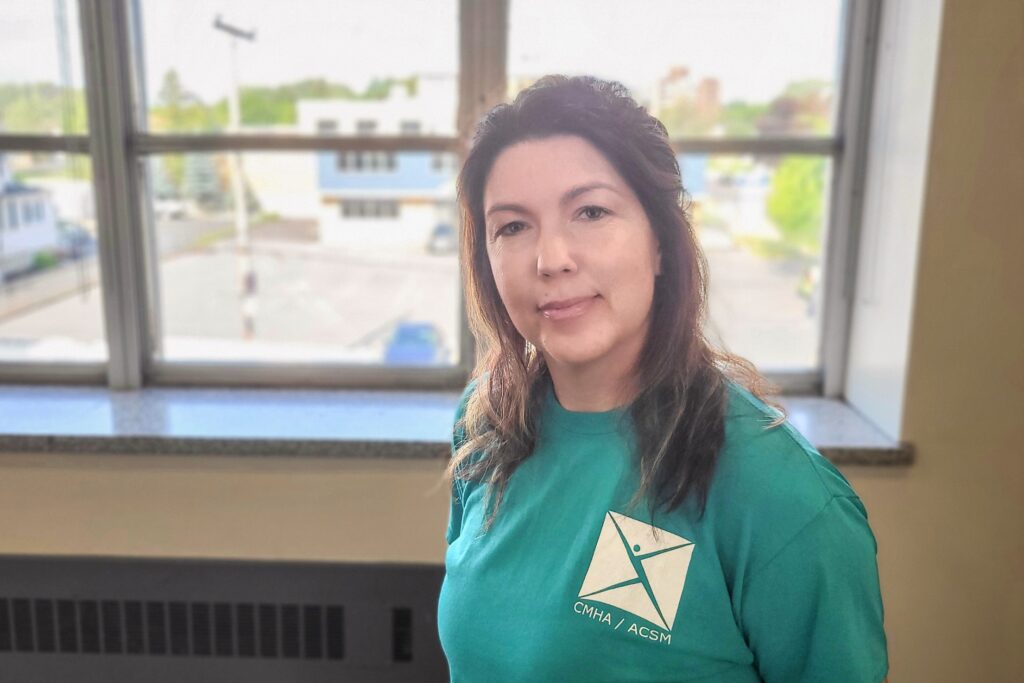
Interview and Photo by Jason Setnyk
Cornwall, Ontario – In a world where mental health challenges often remain hidden behind a veil of stigma, Angele D’Alessio has been a beacon of light and change for the past 17 years. As a dedicated Mental Health Promoter and Educator at the Canadian Mental Health Association – Champlain East, D’Alessio’s remarkable career has been fueled by a relentless commitment to raising awareness, combating stigma, and fostering mental well-being for all.
The Canadian Mental Health Association, founded in 1918, stands as one of the oldest national charitable organizations in Canada. The local branch has been active since 1971, and D’Alessio’s tenure reflects the association’s core mission – to promote and improve mental health within the community via community-based programs and services. Her work is a powerful reminder that through education, understanding, and open dialogue, the journey to improved mental health is one that we can all embark upon together.
Five Questions with The Seeker
1 – Over your 17 years of experience, how have you seen attitudes towards mental health change in the community?
“I was hired in 2006- although it was only 17 years ago, a lot has changed, including attitudes, perception, and improved education. The year I started as an educator, there was no Mental Health First Aid course, Bell Let’s Talk Anti-Stigma initiative would not exist until 2011. It was a challenge to share messaging around mental health, and our awareness events were not well attended. To say there was a reluctance to speak on this subject would be an understatement. It was challenging, and I often found myself discouraged. Over the past decade, however, things started to shift thanks to the many initiatives happening nationwide. YourTV Cornwall played a huge role in helping CMHA Champlain East advance its mandate of education and awareness. They promoted and attended every event we hosted – they provided us a platform to educate the community on mental health topics with our very own program titled “Mental Health Matters” going into its 7th season. Our media partners publish Monthly “Mental Health Matters” articles. I often say when interviewed, “We have arrived” now we need to keep the momentum going.”
2 – Could you share a specific success story or a moment that stands out in your career, where your efforts made a positive impact on an individual or the community?
“The reason I do what I do is exactly for this reason, sharing impactful moments like this one. I have witnessed many magical moments over my career. Still, one that stands out to me was a young student 15 years old who had participated in a presentation years ago at one of our local high schools – specifically a suicide prevention presentation. I often wondered how much students were taking in as it can be a challenging topic to discuss- but weeks later, we received an email thanking us for the information shared at a class presentation as the information she had learned saved her father’s life. This is one example of dozens over the years – it is reassuring to know that Mental Health Matters! It shows that the impact on just one person can have a trickle-down effect.”
3 – Mental health is a broad and diverse topic. What areas have you focused on during your tenure at CMHA, and why did you choose these areas?
“Youth has always been a high priority for us as the data indicates the average age of onset of mental illness is 14. In 2001 before my time at CMHA, the Ministry of Education added mental health to the Physical Education curriculum. St. Joseph’s Secondary School here in Cornwall was the first school to reach out to CMHA to create a partnership in educating youth on mental health. Through this partnership, the TAMI program was born. The Talking about Mental Illness program is still being offered to schools today, with well over a dozen volunteer guest speakers sharing their stories of hope, resilience, and recovery. Recently we have shifted to addressing mental health to all ages as the pandemic has left people struggling with their mental health, particularly in social connections. We have a strong focus on providing programs that support social connection and mental health, such as Living Life to the Full and Mood Walks.
4 – What is the most significant misconception about mental health, and how can we work to dispel it?
“In my opinion, there is this pre-conceived idea that individuals struggling with mental health cannot get better. I am here to say that this could not be further from the truth. I have personally met and worked with individuals over the 17 years who not only manage their mental health but are thriving. A huge part of the education and awareness we do is highlighting that recovery is possible and probable!”
5 – How do you collaborate with other organizations and stakeholders to advance mental health initiatives in the community?
“I am part of several committees that work together to improve mental health for all. Vibrant Communities and the Suicide Prevention Coalition, to name a few. We also have a strong collaboration with all four school boards. CMHA cannot do this work alone, and we are very fortunate to have tremendous support from various community partners, businesses, and schools. United Way SDG has supported our programs since the very beginning and is an important partner in our goal to make mental health for all a reality.”
To learn more about services from Canadian Mental Health Association – Champlain East, visit their website.












